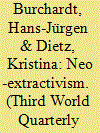| Srl | Item |
| 1 |
ID:
131381


|
|
|
|
|
| Publication |
2014.
|
| Summary/Abstract |
This paper addresses new challenges and identifies starting points for development theory following recent debates in Latin America on 'new or neo-extractivism'. It focuses on the concept of neo-extractivism and the context of its emergence, and on the changing role of the state. Looking at a number of social economic indicators, we find that, even after considering differences between countries, (neo-)extractivism is not merely a temporary economic strategy in the region. Instead, it exhibits features of a consolidated development project. Empirical evidence from the region shows the fundamental implications of resource-based development paths in politics, social relations and territorial orders. To grasp these implications conceptually, we argue for a shift in theoretical perspectives related to the link between development and resource extraction. Key elements for such a shift are to be found in recent studies in rentier theory and politics and new approaches in the field of political ecology.
|
|
|
|
|
|
|
|
|
|
|
|
|
|
|
|
| 2 |
ID:
096919


|
|
|
|
|
| Publication |
2010.
|
| Summary/Abstract |
This article analyses states' support for international norms relating to the location of international boundaries. The key norms relate to the legitimacy of the international use of force, the placement of boundaries relative to previous international boundary accords, the views of populations, and broadly accepted ethical standards. These norms have become stronger over recent centuries, but their relative strength has varied. In comparing the influence of these norms in territorial disputes, this study aims to contribute to the understanding of international territorial politics and of the evolution of state sovereignty. Of particular note is that self-determination and human rights have achieved some modest but historically significant gains since the end of the Cold War.
|
|
|
|
|
|
|
|
|
|
|
|
|
|
|
|